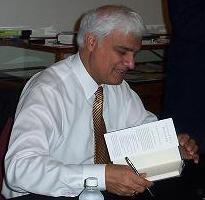Ravi Zecharias
| Ravi Zacharias | |||||||||||||||
|---|---|---|---|---|---|---|---|---|---|---|---|---|---|---|---|

Zacharias in 2004
|
|||||||||||||||
| Born |
Frederick Antony Ravi Kumar Zacharias 26 March 1946 Madras, Madras Presidency, British India |
||||||||||||||
| Residence | Atlanta, Georgia, US | ||||||||||||||
| Nationality | Indian, Canadian, and American | ||||||||||||||
| Occupation | Christian apologist, Founder and Chairman of the Board of Ravi Zacharias International Ministries | ||||||||||||||
| Website | http://rzim.org | ||||||||||||||
|
|||||||||||||||
| Ravi Zacharias | |
|---|---|
| Era | 21st-century philosophy |
| Region | Western Philosophy |
| School | Christian philosophy |
|
Main interests
|
Philosophy of religion, Christian Apologetics, Worldview |
|
Notable ideas
|
Four Criteria for a Coherent Worldview |
Ravi Zacharias (born 26 March 1946) is an Indian-born Canadian-American Christian apologist. A defender of traditional evangelicalism, Zacharias is the author of numerous Christian books, including the Gold Medallion Book Award winner Can Man Live Without God? in the category "theology and doctrine" and Christian bestsellers Light in the Shadow of Jihad and The Grand Weaver. He is the founder and chairman of the board of Ravi Zacharias International Ministries, host of the radio programs Let My People Think and Just Thinking, and has been a visiting scholar at Ridley Hall, where he studied moralist philosophers and literature of the Romantic era. Zacharias held the chair in Evangelism and Contemporary Thought at Alliance Theological Seminary from 1981 to 1984. Evangelical Christian leader Chuck Colson referred to Zacharias as "the great apologist of our time."
Zacharias was born in Madras, India. He is descended from a woman of the Nambudiri Brahmin caste and a Christian man of the Boatman caste. His mother was from Madras (now Chennai) while his father was from Kerala. He grew up in Delhi. According to Zacharias, before her marriage, Swiss German missionaries had spoken to his Brahmin ancestor about Christianity and she had converted and had been made an outcast by her Brahmin family and community. Zacharias grew up in a nominal Anglican household, and says that he was an atheist until the age of 17 when he tried to commit suicide by swallowing poison. While in the hospital, a local Christian worker brought him a Bible and told his mother to read to him from John 14. Zacharias says that it was John 14:19 that touched him and meant to him as the defining paradigm: "Because I live, you also will live." He said that he thought, "This may be my only hope: A new way of living. Life as defined by the Author of Life." and that he committed his life to Christ praying, "Jesus if You are the one who gives life as it is meant to be, I want it. Please get me out of this hospital bed well, and I promise I will leave no stone unturned in my pursuit of truth." In 1966 Zacharias emigrated with his family to Canada, earning his undergraduate degree from the Ontario Bible College in 1972 (now Tyndale University College & Seminary) and his M.Div. from Trinity International University. In 1990 Mr. Zacharias did a 2-3 month sabbatical at Ridley Hall in the town of Cambridge. Zacharias has multiple honorary doctoral degrees.
...
Wikipedia
